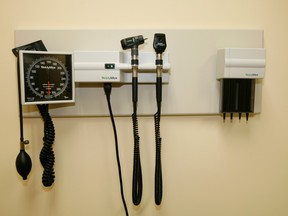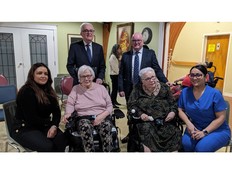Doctors question their ability to save for retirement amid tax change
Federal budget revealed the Trudeau government plans to increase share of capital gains that are taxed

Article content
New Brunswick’s doctors say the federal budget’s proposed increase to the capital gains tax will “further limit” their ability to keep practicing and save for retirement at the same time.
It’s a concern coming from physicians across the country.
But New Brunswick Medical Society president Dr. Paula Keating says the fiscal pressures are being disproportionately felt in this province where income tax levels are also high.
It’s a formula she says adds up to discouraging new doctors amid a significant shortage.
That’s as Prime Minister Justin Trudeau rejected the concerns, stating his government is requesting “the most successful in this country to do a little bit more to make sure that everyone can see themselves in the success of this country.”
Last week’s federal budget revealed that the Trudeau government plans to increase the share of capital gains that are taxed from 50 per cent to 66.7 per cent for individuals with more than $250,000 in capital gains in a year.
That impacts doctors as they often incorporate their medical practices.
When doctors, or other professionals who have created a corporation, earn income, instead of putting a portion of it toward a retirement saving plan, they often retain that money inside their corporation and invest it.
Those investments grow over time to become their retirement fund.
But that money is subject to a capital gains tax when their investments are liquidated.
How much is now going up.
Keating says that change is just the latest in a series of pressures facing doctors.
“Physicians, many of whom are small business owners, face significant operational costs which have been exacerbated by rising inflation in recent years,” Keating said in a statement.
“In addition, they are already subject to some of the highest income tax rates in the country, and these proposed changes will further limit their ability to maintain their practice and save for retirement in the process.”
That reference is to New Brunswick’s income tax rate of 19.5 per cent on the portion of taxable income over $185,064.
It’s second highest in the country at that threshold, only behind Quebec.
In an interview, John Oakey, vice-president of taxation for the Chartered Professional Accountants of Canada, said he doesn’t believe that the proposed tax change on its own is enough to cause doctors or other professionals to pack up and leave.
But he said that repeated changes to tax law creates an uncertainty that is unattractive to higher earners.
“Doctors did it this way because the tax rules allowed doctors to do that,” Oakley said.
“But if you keep changing the tax rules, it makes it very difficult for people to have faith in the system where you should be able to say ‘if I do this, 20 years from now this will be my outcome.’
“If you keep changing it, then people will start to look where the tax laws are a little more friendlier.”
The comments come as the Canadian Medical Association issued similar concerns on Tuesday, believing that capital gains tax changes “will have adverse effects on physician recruitment and retention across the country.”
“Many community-based physicians have incorporated their practices as a means of efficiently delivering health services to Canadians,” said president Dr. Kathleen Ross.
“They also rely on their professional corporations as a means of saving for retirement since most do not have access to employer retirement plans.
“Increasing the capital gains inclusion rate for corporations will create another barrier to retaining and recruiting physicians in a time when our health system and the providers within it are already under constant strain.”
Ross added: “The risk of already over-stretched physicians leaving the profession or reducing their hours in response to heightened taxation is real.”
In response to the concerns of physicians, Trudeau says he’s pressing forward.
“This is about the fact that in order for people to succeed across this economy, at all generations, we need young people to succeed, we need young people to be able to buy homes in the coming years, we need young people to be confident of the future,” he said, speaking to reporters in Saskatchewan this week.
“So yes we are asking the most successful in this country to do a little bit more to make sure that everyone can see themselves in the success of this country.”
Trudeau also addressed the impact on those selling a second residence.
“At a time when young people have started to give up on the dream of eventually ever being able to own a home, it was really important to rebalance the situation,” he said.
“I understand for some people this may cost more if they sell a cottage or a secondary residence. But, young people can’t buy their primary residences yet.”
Keating adds that the move comes at a time when the country is facing a national physician shortage.
“Any measure which could disincentivize current physicians from practicing, discourage new graduates from choosing to practice in Canada, and steer incoming medical students away from medicine altogether is ill-advised, to say the least,” she said.












Postmedia is committed to maintaining a lively but civil forum for discussion. Please keep comments relevant and respectful. Comments may take up to an hour to appear on the site. You will receive an email if there is a reply to your comment, an update to a thread you follow or if a user you follow comments. Visit our Community Guidelines for more information.